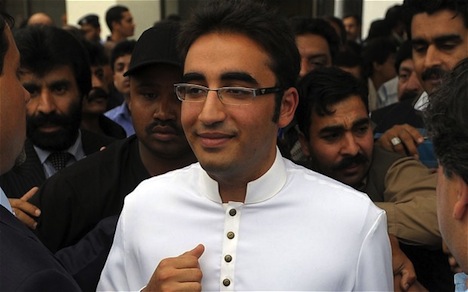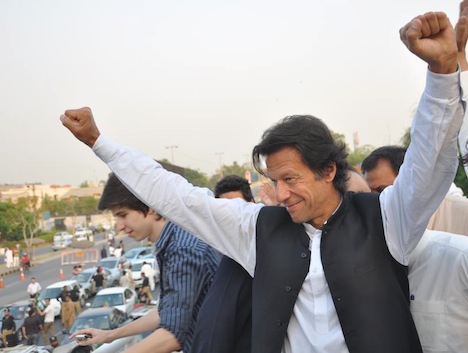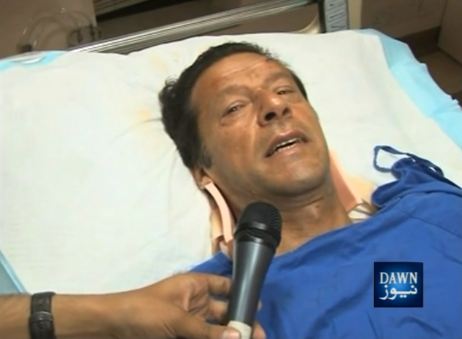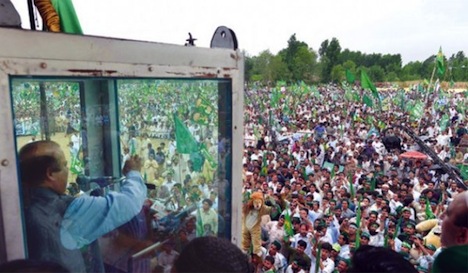I said he was one of the top 13 politicians to watch in 2013 at the beginning of the year, and he’s the next great hope of not just the Bhutto family’s political legacy, but for the entire political fortunes of the Pakistan People’s Party (PPP, پاکستان پیپلز پارٹی),, and the May 2013 elections were supposed to mark his grand entrance into Pakistani politics.![]()
But with just a handful of days left in the PPP’s campaign to hold on to power in Pakistan, Bilawal Bhutto Zardari has been all but absent from the campaign, and news reports claim that he’s actually no longer within Pakistan due to security threats against him.
The reason? The widespread violence already perpetrated and currently threatened against the PPP in particular by the Tehreek-i-Taliban Pakistan (TTP, تحریک طالبان پاکستان), the ‘Pakistani Taliban’ terrorist group that opposes the government, above all for its cozy links to U.S. and NATO defense forces.
But the fact that the son of Pakistan’s current president, Asif Ali Zardari, has left the country out of concern for his life, speaks to the current state of Pakistan’s security situation. Bhutto Zardari, at age 24, is still too young to contest Saturday’s elections, and he was never seriously considered as a possibility to emerge as prime minister in 2013.
His decision proved especially wise today in light of the abduction of Ali Haider Gilani, the son of former PPP prime minister Yousuf Raza Gilani.
You can question whether it’s healthy for one family to play such an oversized role in politics (whether the Bhutto family in Pakistan, the Gandhi family in India or even the Bush family in the United States), but there’s no doubt that Bhutto’s family has paid dearly for its starring role in the center of Pakistan’s civilian politics.
Zulfikar Ali Bhutto, who founded the PPP, led Pakistan’s government in the 1970s, but a military government convicted and executed him in 1979.
Benazir Bhutto, who served as prime minister in the 1980s and the 1990s, was assassinated in a December 2007 bomb blast just days after she returned from abroad to contest the 2008 parliamentary elections.
So you can’t really blame Bhutto Zardari for keeping such a low profile — he’s barely just reached adulthood after an adolescence spent mostly abroad, matched by the twin tragedies of his mother’s assassination and the ghost of his grandfather’s execution.
But his absence marks an even wider leadership crisis in Pakistan’s governing party. Though there are many reasons why the PPP is slumping in the 2013 elections, one factor is certainly the lack of any sort of strong presence at the head of the party.
Although Zardari and his son are the joint leaders of the PPP, Zardari, as Pakistan’s head of state, is unable to take a full-throated role leading the campaign. Nor would be incredibly effective if he could — he won the presidency in 2008 in part through sympathy for his late wife, Benazir, and his tenure in office has been marked by widespread corruption and impunity.
Gilani, who served as prime minister from 2008 to 2012, was ousted by Pakistan’s supreme court after refusing to facilitate a Swiss investigation into Zardari’s alleged graft. His successor, Raja Pervez Ashraf, a former water minister, served a largely caretaker role from 2012 until March 2013, and like Gilani, he’s refused to cooperate with Pakistan’s supreme court. Ashraf, who has his own corruption issues, was initially barred himself from contesting the 2013 parliamentary elections.
That’s left the PPP virtually decapitated throughout the campaign. That stands in contrast to its two major rivals, the Pakistan Muslim League (N) (PML-N, اکستان مسلم لیگ ن) and the Pakistan Tehreek-e-Insaf (Movement for Justice or PTI, پاکستان تحريک). The ‘N’ in PML-N stands for Nawaz Sharif, one of Pakistan’s wealthiest businessmen who was twice elected prime minister in the 1990s. The PTI’s leader, Imran Khan, has been active in Pakistani politics as an anti-corruption crusader for two decades and was a national cricket star in the years prior to his entry into politics.
Photo credit to AFP/Getty Images.



